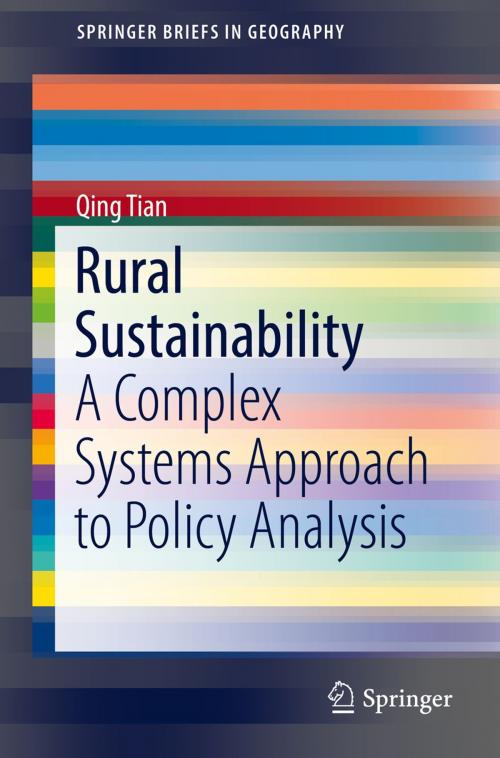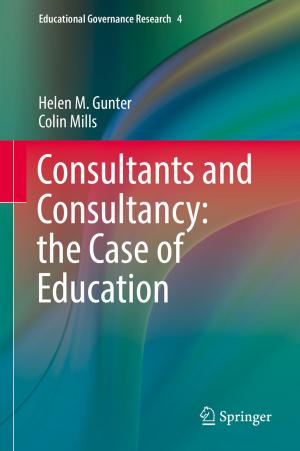Rural Sustainability
A Complex Systems Approach to Policy Analysis
Nonfiction, Science & Nature, Science, Earth Sciences, Geography, Biological Sciences, Environmental Science, Nature| Author: | Qing Tian | ISBN: | 9783319526850 |
| Publisher: | Springer International Publishing | Publication: | May 22, 2017 |
| Imprint: | Springer | Language: | English |
| Author: | Qing Tian |
| ISBN: | 9783319526850 |
| Publisher: | Springer International Publishing |
| Publication: | May 22, 2017 |
| Imprint: | Springer |
| Language: | English |
This volume applies the science of complexity to study coupled human-environment systems (CHES) and integrates ideas from the social sciences of climate change into a study of rural development amid flooding and urbanization in the Poyang Lake Region (PLR) of China. Author Qing Tian operationalizes the concept of sustainability and provides useful scientific analyses for sustainable development in less developed rural areas that are vulnerable to climatic hazards.
The book uses a new sustainability framework that is centered on the concept of well-being to study rural development in PLR. The PLR study includes three major analyses: (1) a regional assessment of human well-being; (2) an empirical analysis of rural livelihoods; and (3) an agent-based computer model used to explore future rural development. These analyses provide a meaningful view of human development in the Poyang Lake Region and illustrate some of the complex local- and macro-level processes that shape the livelihoods of rural households in the dynamic process of urbanization. They generate useful insights about how government policy might effectively improve the well-being of rural households and promote sustainable development amid social, economic, and environmental changes.
This case study has broader implications. Rural populations in the developing world are disproportionally affected by extreme climate events and climate change. Furthermore, the livelihoods of rural households in the developing world are increasingly under the influences of macro-level forces amid urbanization and globalization. This case study demonstrates that rural development policies must consider broader development dynamics at the national (and even global) level, as well as specific local social and environmental contexts. By treating climate as one of many factors that affect development in such places, we can provide policy recommendations that synergistically promote development and reduce climatic impacts and therefore facilitate mainstreaming climate adaptation into development.
This volume applies the science of complexity to study coupled human-environment systems (CHES) and integrates ideas from the social sciences of climate change into a study of rural development amid flooding and urbanization in the Poyang Lake Region (PLR) of China. Author Qing Tian operationalizes the concept of sustainability and provides useful scientific analyses for sustainable development in less developed rural areas that are vulnerable to climatic hazards.
The book uses a new sustainability framework that is centered on the concept of well-being to study rural development in PLR. The PLR study includes three major analyses: (1) a regional assessment of human well-being; (2) an empirical analysis of rural livelihoods; and (3) an agent-based computer model used to explore future rural development. These analyses provide a meaningful view of human development in the Poyang Lake Region and illustrate some of the complex local- and macro-level processes that shape the livelihoods of rural households in the dynamic process of urbanization. They generate useful insights about how government policy might effectively improve the well-being of rural households and promote sustainable development amid social, economic, and environmental changes.
This case study has broader implications. Rural populations in the developing world are disproportionally affected by extreme climate events and climate change. Furthermore, the livelihoods of rural households in the developing world are increasingly under the influences of macro-level forces amid urbanization and globalization. This case study demonstrates that rural development policies must consider broader development dynamics at the national (and even global) level, as well as specific local social and environmental contexts. By treating climate as one of many factors that affect development in such places, we can provide policy recommendations that synergistically promote development and reduce climatic impacts and therefore facilitate mainstreaming climate adaptation into development.















